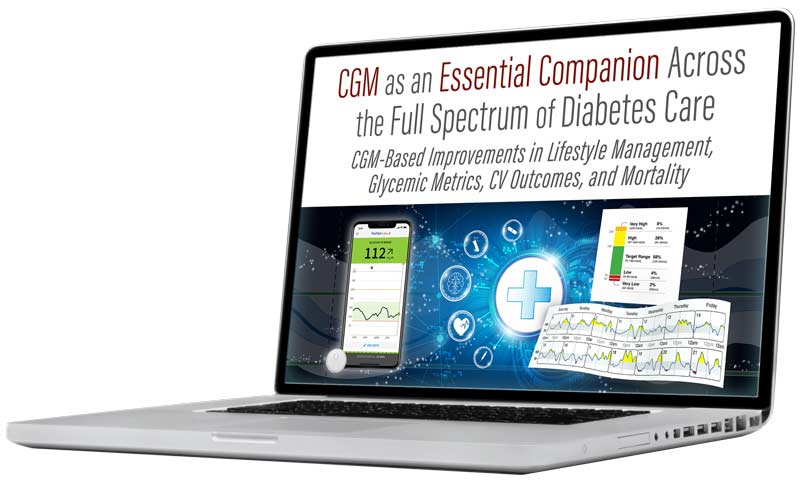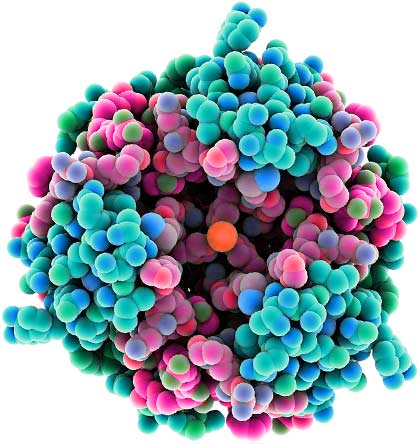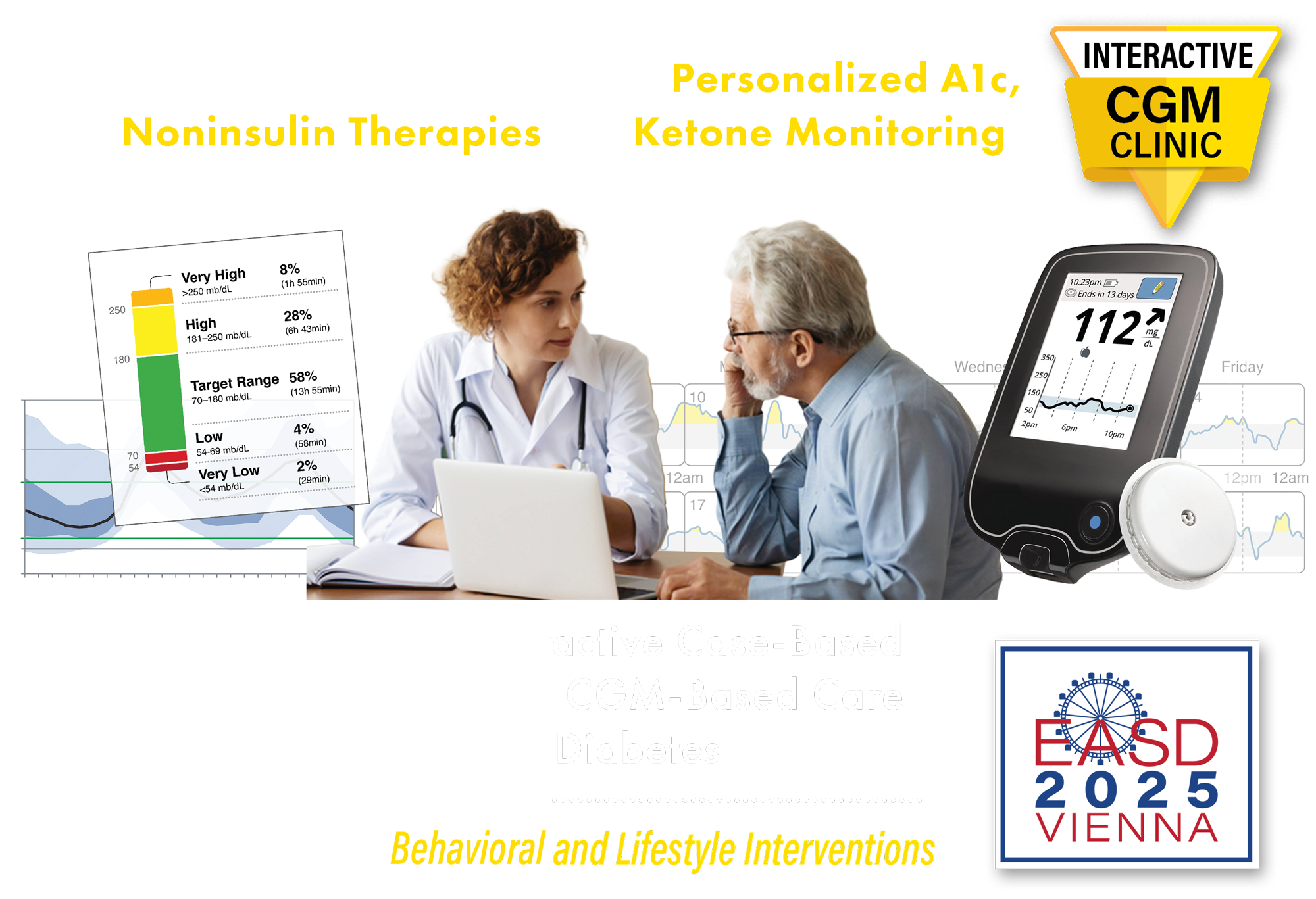SAVE THE DATE:
You and your endocrinology and diabetes specialist colleagues are invited to
An EASD 2025 CME Expert Board Industry Session on

Save the Date and Time – Register Now!
Monday,15 September 2025
Registration: 10:00 – 10:30 CET
Scientific Program: 10:30 PM – 12:00 CET
Location: Messe Vienna
Meeting Room: Milan Hall

For more information:
info@cmeducation.net
Program Agenda
10:30 – 10:50
Dual Continuous Glucose and Ketone Monitoring Across Diabetes Care
Richard Bergenstal, MD
Executive Director Park Nicollet International Diabetes Center Adjunct Professor, Department of Medicine University of Minnesota St. Louis Park, MN
10:50 – 11:15
CGM-Mediated Improvements in HbA1c and Noninsulin Regimen Adherence
Prof. Monika Kellerer, MD
Professor of Internal Medicine Director, Department of Diabetology and Endocrinology, Angiology, Intensive Care Unit and Cardiology Marienhospital Stuttgart University of Tübingen, Germany
11:15 – 11:35
The Foundational Role of CGM for Personalized HbA1c Optimization
Prof. Ramzi Ajjan, MD, PhD
11:35 – 12:00
Translating CGM Technologies into Real World Case-Based Diabetes Management
Univ. Prof. Thomas Wascher – Program Chair
Head Diabetology, Endocrinology, Metabolic Diseases 1st Medical Department Hanusch Hospital Vienna, Austria

Program Chair and Faculty
Univ. Prof. Thomas Wascher
— Program Chair

Head Diabetology, Endocrinology, Metabolic Diseases
1st Medical Department
Hanusch Hospital
Vienna, Austria
Prof. Ramzi Ajjan, MD, PhD

Professor of Metabolic Medicine
Consultant in Diabetes and Endocrinology
University of Leeds and Leeds Teaching Hospitals Trust
Leeds, United Kingdom
Prof. Monika Kellerer, MD

Professor of Internal Medicine
Director, Department of Diabetology and Endocrinology, Angiology, Intensive Care Unit and Cardiology
Marienhospital Stuttgart
University of Tübingen, Germany
Richard Bergenstal, MD

Executive Director
International Diabetes Center- Park Nicollet
Minneapolis, MN
EDUCATIONAL AND LEARNING OBJECTIVES
Upon completion of this activity, participants will be able to:
- Outline and discuss the evidentiary basis for sensor-based CGM technologies, and how to best Implement CGM-based technologies into their overall diabetes care plans for persons with T2D and T1D within the diabetes and endocrinology specialty setting.
- Analyze the rationale and evidence for recommending and facilitating adoption of technology-centric CGM monitoring and treatment plans using patch-and-reader-based technologies.
- Compare and contrast available CGM-facilitating monitoring technologies and pair such technologies with optimal patient profiles.
- Educate persons with diabetes about the rationale, evidence, and outcome- optimizing results associated with technology-based, patient-centric and physician-directed CGM monitoring strategies that can be used to effect .optimal lifestyle, diet-, and pharmacology-based approaches to attaining guideline-based HA1c levels in persons with T2D and T1D.
- Identify which persons with diabetes are ideal candidates for a technology-based, patient-directed glucose monitoring system.
- Interpret and apply data and results from clinical trials in CGM-facilitating monitoring technologies to improve patient care, improve safety of drug therapy for T2D and T1D, detect and mitigate risk of hypoglycemia, improve patient- and physician-directed changes in antidiabetic therapy, reinforce the safe use of antidiabetic drugs, and facilitate patient-activated drug titration, glycemic monitoring and disease management.
- Translate landmark clinical studies focused on CGM-based technologies to the front lines of clinical practice in the diabetes and primary care; and understand the translational implications of deploying sensor-based CGM technologies as a foundational approach to improving outcomes in patients across the spectrum of diabetes.
TARGET AUDIENCE — WHO SHOULD ATTEND
This Clinical Excellence Summit is directed at the following: diabetes and endocrinology specialists and researchers and related healthcare providers who manage patients with Type 2 or Type 1 diabetes.
GRANTOR SUPPORT
Supported by an educational grant from Abbott Diabetes Care.
ACCREDITATION STATEMENT
This activity has been planned and implemented in accordance with the accreditation requirements and policies of the Accreditation Council for Continuing Medical Education (ACCME) through the joint providership of the University of Massachusetts Chan Medical School and CMEducation Resources, LLC. The University of Massachusetts Chan Medical School is accredited by the ACCME to provide continuing medical education for physicians.
CREDIT DESIGNATION STATEMENT
The University of Massachusetts Chan Medical School designates this enduring material for a maximum of 1.5 AMA PRA Category 1 Credits(s)™. Physicians should claim only the credit commensurate with the extent of their participation in the activity.
FACULTY & PROVIDER DISCLOSURE
It is the policy of the University of Massachusetts Chan Medical School to ensure fair balance, independence, objectivity and scientific rigor in all activities. All faculty participating in CME activities sponsored by the University of Massachusetts Chan Medical School are required to present evidence-based data, identify and reference off-label product use and disclose all relevant financial relationships with those supporting the activity or others whose products or services are discussed. Faculty disclosure will be provided in the activity materials.
Industry session on the occasion of EASD 2025.
———
